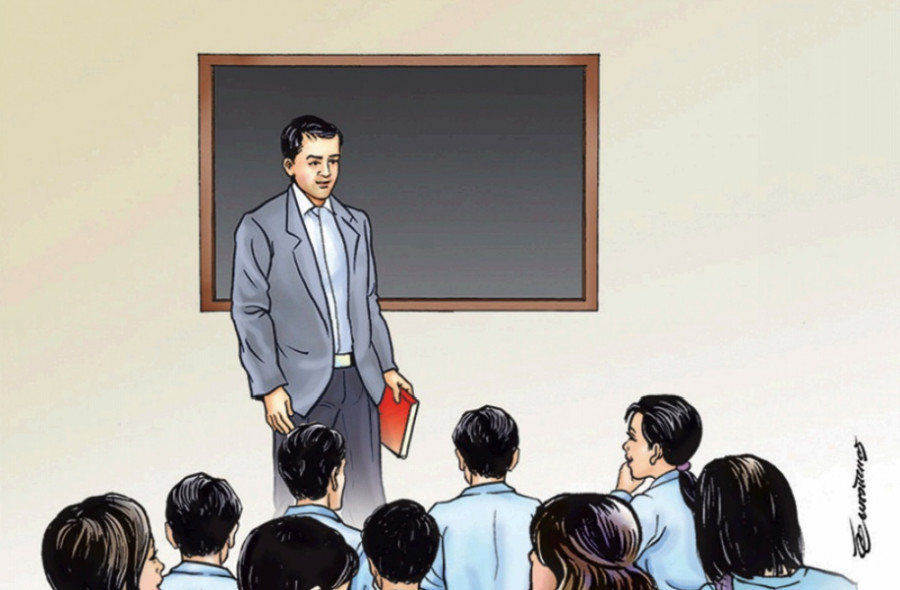Columns
Putting teachers first
Investment in infrastructure must not undermine the need to empower and support teachers.
Bijaya Mani Paudel
In the discourse surrounding education reform in Nepal, the focus is often on physical infrastructure—bigger buildings, expansive spaces, lush gardens, sports facilities and the like. These elements certainly contribute to a conducive learning environment, but amidst all the clamour for grand structures, one fundamental aspect often goes unnoticed—teacher development.
It’s common to see teachers being blamed for the sorry state of education in our country, particularly in public schools. Education experts, journalists and stakeholders are generally quick to criticise the teachers. However, despite the scrutiny and critique, the quality of education continues to deteriorate. Some teachers and principals have turned their schools into shining examples by taking the initiative to acquire knowledge, learn from best practices and mobilise their communities to enhance the quality of education in their schools. These educators have achieved remarkable results with the resources and knowledge available to them. But they are the exception and not the rule.
The common perception that teachers have become complacent is not entirely unfounded. Teachers might receive training, but its quality and the level of exposure they gain are crucial factors. Many teachers view these training sessions as mere rituals, motivated primarily by the allowances they receive. In some rural areas, the teachers aren't even fortunate enough to get such training. During a recent visit to the Arghakhachi district, I encountered teachers who hadn't received professional development workshops in two decades.
Teacher training
Among the organisations working towards teacher development in Nepal, the work of Teach For Nepal is pretty meaningful. This organisation prepares teachers through a six-week residential program, equipping them with the necessary mindset, knowledge and skills to excel in their roles. What's remarkable is that most Teach For Nepal Fellows do not come from an educational background, yet they achieve exceptional results in the schools they serve. They do not stop at initial preparation; they organise periodic gatherings where fellows share their experiences and challenges and interact with experts to find solutions. Moreover, they conduct monthly workshops for geographically clustered fellows, fostering collaboration and motivation.
The government would do well to draw inspiration from such initiatives. Establishing platforms for teachers to learn from each other and experts is essential. Undoubtedly, this requires resources, as quality education can only be achieved with adequate investment. This was rightly demonstrated by the Delhi Government's practices as they made significant investments in teacher development, arranging workshops within and outside India.
However, training alone for a specific duration is insufficient for the long run. Teachers need continuous mentoring, coaching and support. Managing a classroom and effectively imparting knowledge to students isn't easy. It demands a suitable skill set and attitude, which can be developed and honed only through continuous support. Therefore, a mechanism should be in place for teachers to share their challenges and receive personalised mentoring. Historically, the roles of head teachers, resource persons or school inspectors were designed for this purpose. Regrettably, the educators in these positions often find themselves overwhelmed with multiple responsibilities and have little time to support their teaching staff. Resource persons and school inspectors are sometimes relegated to administrative roles and are often in low numbers in many local governments.
Way forward
A critical starting point is recruiting teachers and recognising their job as a challenging, rigorous and highly respectable profession and giving them the appreciation they deserve. This profession should attract exceptional individuals with strong content competency, a genuine love for teaching students and a steadfast commitment to working in education, even in the face of challenges. Teaching should not be regarded merely as a job but as a noble service and a lifelong career dedicated to nurturing future generations. The government must reform recruitment processes, attracting the best and brightest individuals to the teaching profession.
According to a prominent model in the realm of education called the Academic Impact Model, teachers' underlying beliefs and mindsets shape their knowledge and skills, influencing their actions and behaviour. This ultimately impacts the students' knowledge and skills, determining their achievements. From everyday observations, it is evident that the values and beliefs held by a teacher profoundly influence their ability to provide quality education to children.
Being the custodians of education's values and philosophies, the interpreters of the curriculum and the practitioners of effective pedagogy, it’s imperative to establish mechanisms for strengthening the ability of teachers. Their dedication and competence are paramount in shaping well-rounded and accomplished students who are the nation's future.
Thus, while investments in physical infrastructure and amenities are essential, they must not overshadow the pressing need to empower and support our teachers. Our educators are the bedrock of the education system, and their development should be at the forefront of any education reform agenda. To raise the bar of the country’s education, we must invest in teacher training, a perennial support system and recruiting capable individuals into this noble profession. Strengthening our teachers is not just a choice but an essential step toward ensuring a brighter future for our children and the nation.




 9.89°C Kathmandu
9.89°C Kathmandu















